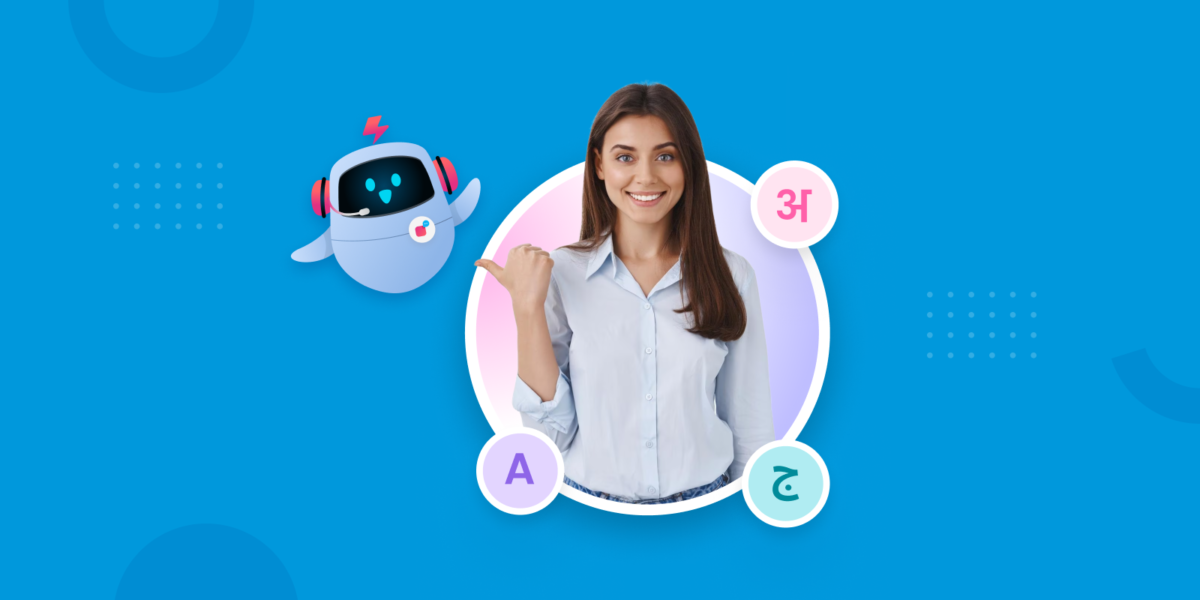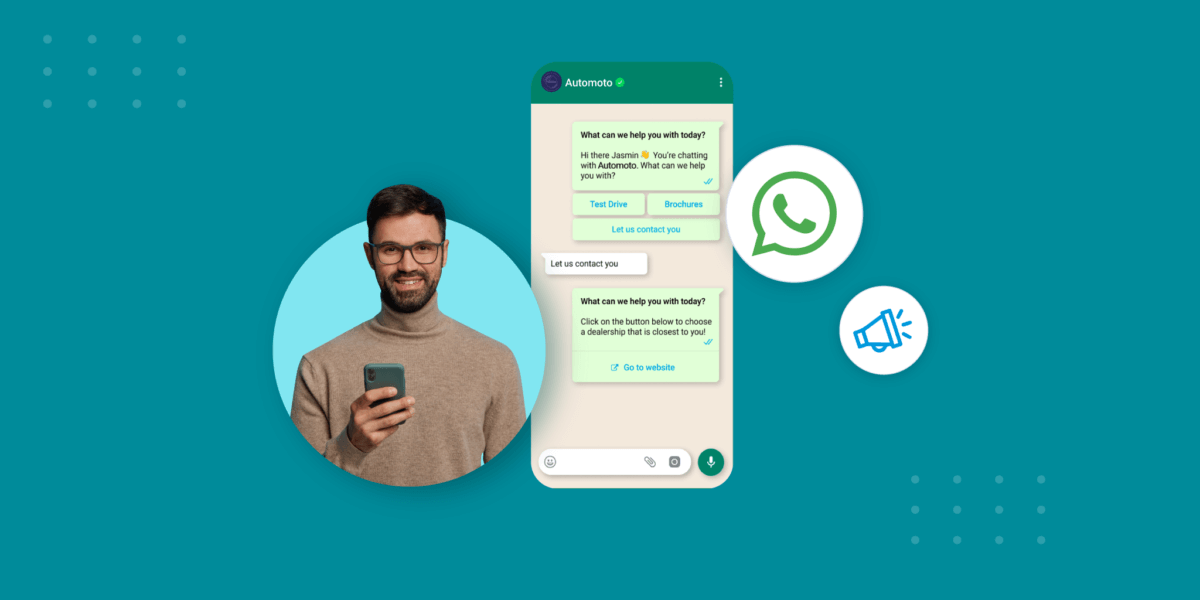AI Chatbots Vs Humans – Which is better?
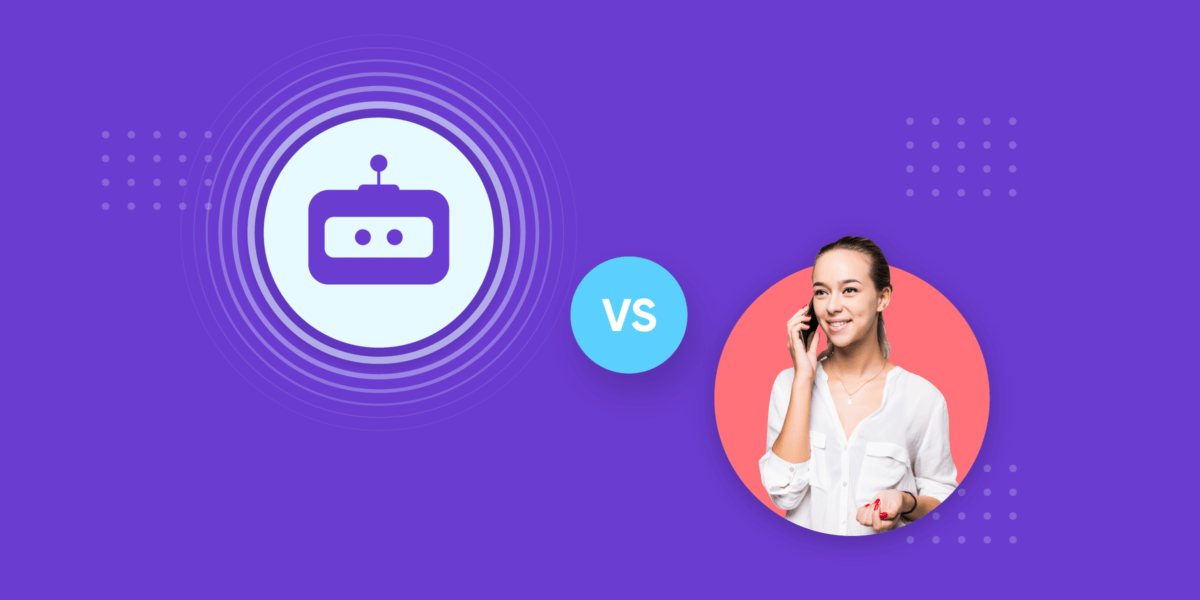
AI Chatbots Vs Humans – Which is better?
Companies are questioning which service is better for their customers – human or AI-powered chatbot based. We examine both these options in our post.
Human conscience is irreplaceable. At least it is, for a foreseeable future.
It comes as no surprise that customers want to be treated with empathy. They want businesses to understand where they are coming from to deliver them the right value in time. While live agents have been great at serving customers aptly, the question of AI vs humans persists.
Is AI better than people at customer service or have human agents set a bar so high? At what point can you bring digitisation and human touch together to amplify customer experiences?
While people are immensely satisfied with their issues being resolved 24*7 without a hold period, many note the concurrent loss of the human touch. 47% of businesses are still hesitant to use chatbots because of their inability to understand human input.
Talking about the chatbots vs humans issue raises an important question: Are chatbots having the edge over humans in customer service? To try and answer this, let us briefly look at the customer service aspects provided by both sides and the benefits they are expected to deliver.
Strengths of having humans for customer service
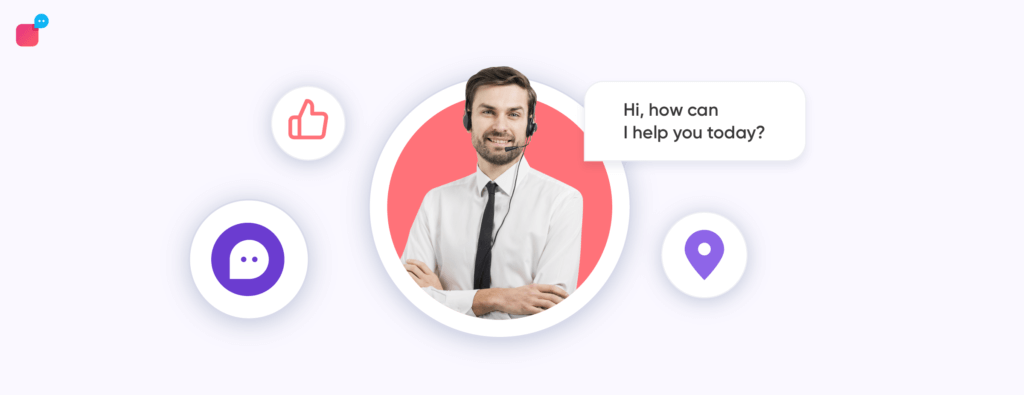
To start with, 79% of customers prefer chatting with agents because of the immediacy it offers. Research conducted by Econsultancy suggests this. Undoubtedly, the responses of a live chat or a human on the customer service end are more personalised and friendly.
However, human agents are usually a lot more skilled to work on tasks that are more complex in nature. Asking agents to work on simple and repetitive tasks retards their growth and impedes your team’s scalability. On the other hand, the strengths offered are significant. The primary benefits of using humans over chatbots for customer service are described below.
1. Compassionate messaging goes a long way
The flexibility in response and the empathy that humans offer to customers are unique in all aspects. Over 40% of people prefer to get their queries resolved through a live chat than any other way. This is simply because humans are emotional, and when their problems are solved with a personal touch and consideration, customers end up more satisfied.
Suggested Reading: 20 Tips For Effective Live Chat Support
2. Live agents are more dynamic
Not all issues are serious, but some need a response in the blink of an eye. Live agents are capable of swerving from their usual course of action to make changes the situation warrants to render better CX. Chatbots follow a routine. If queries get to complex and the chatbot is unable to improvise, it needs to route the ticket to an available agent.
3. Cultural sensitivity is appreciated
Businesses deal with customers of different ethnicities, cultures, backgrounds, and demography. Understanding various aspects and the nature of the customer based on these factors can help deliver better services. The capability to ensure cultural sensitivity is one of the key benefits of having humans instead of chatbots as customer service providers.
4. An experience-driven approach is beneficial
Humans learn by experience. With over years of experience, customer service providers learn about various situations and use them for better service delivery. Humans are cognitively equipped to handle irritated, angry, disappointed or even panicky customers.
Suggested Reading: Address Customer Complaints And Better Your Customer Relationship
5. Easy to understand the human tone
Chatbots can not understand the tone of a customer, but humans can. Understanding humour, sarcasm, anger, and other such emotional attributes can help the customer service provider to solve the problem smoothly without delay.
AI Chatbots, A New Fit for Customer Service

Chatbots are essentially computer-programmed software that use machine learning and artificial intelligence to serve customer queries. In a recent 12 month Facebook study, over 67% of users worldwide used chatbots to get customer support. There is a reason why chatbots are getting widely accepted as many businesses’ primary mode of customer support.
Indeed, chatbots are gaining worldwide appreciation based on their strengths, which include:
1. Better response time
While facing a problem or looking for support, a quick response is always appreciated. Chatbots are quite helpful, especially for shopping portals. Online retail, for example, has one of the highest adoption of chatbots. In fact, by 2023, shoppers will transact up to $112 billion only through chatbots. This is undoubtedly and largely the case with the rest of the world too.
2. Choose the language you like
Chatbots can be trained to comprehend, assess and respond in the language your users prefer. For example, if you are in the UAE, you can train your chatbot to converse in Arabic. Or if you operate out of Southeast Asia, your chatbot can train on Bahasa Indonesia to communicate with users better.
Which language are you most comfortable with? Usually, when discussing queries and seeking their resolution, chatbots can eliminate the language barrier as they offer multiple language choices for smooth processing.
Suggested Reading: Scale Your Operations Overseas With A Multilingual Chatbot
3. Time and number is no limit
A chatbot can work endlessly and handle multiple requests at a time. The same is not possible for humans. For companies leveraging human customer service, the night hours are usually downtime, or a part of the day will be booked as a break, even when there are shifts. But for chatbots, there is no break or limit to work, so as a customer, you are free to contact the service round the clock.
4. No leave, no training, reduced cost
According to Chatbots Magazine, businesses can minimise customer service costs by up to 30% by applying and using a conversational chatbot. With no leave, no need for training, and no errors, they can reduce a business’ overall costs. Also, since chatbots can offer service to multiple customers, shifts are eliminated, reducing hiring costs.
Suggested Reading: Save Money By Switching To Customer Support Automation
5. Learning is consistent
Chatbots have machine learning capabilities and learn based on what is fed to them. Based on the neural connections, they learn continuously and constantly to offer better service. By answering up to 80% of frequently asked questions, chatbots can help businesses save on operational costs, states IBM.
Who has the edge in customer service: AI or Humans?
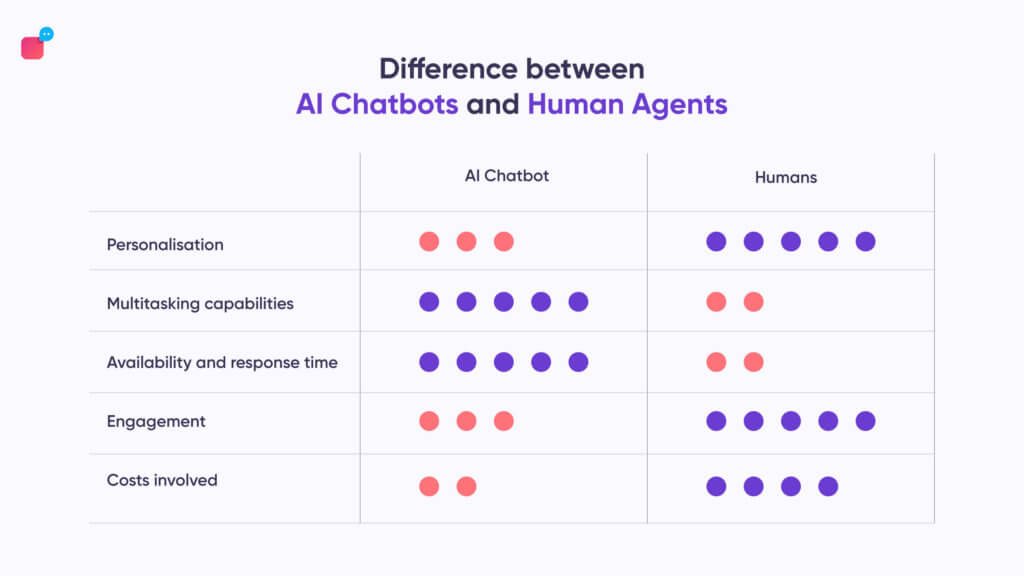
Humans have their strengths. And these strengths have largely played a role in customer support for decades. Whereas, today chatbots are emerging as one of the finest choices for support teams. AI Chatbots vs humans is a situation to be resolved.
The other question that arises is whether AI chatbots vs humans is truly a battle of the opposites, or can they complement each other? While various companies feel either one needs to be adopted, Verloop.io offers an in-depth comparison of the two based on the basic strengths of each as below:
1. Understanding with personalisation
While a customer queries about their problem, the humans have the acquired skill of understanding by probing questions. They are more mindful about the problem at hand as it’s easy for them to veer their responses according to what fits the situation best. However for chatbots, the responses can sound templated that might irk customers rather than helping. So, for an understanding with personalisation, it’s humans in humans vs AI.
2. Multitasking capabilities
No matter how diligent a human is, s/he cannot handle hundreds of queries at a time. Agents today are overburdened with more work as it is. In truth, 74% of contact centre agents are at the risk of burnout! Whereas, a chatbot can handle multiple repetitive requests and give resolution users simultaneously – enhancing the overall user experience. So, a chatbot is a clear winner in multitasking when it comes to chatbots vs humans.
3. Availability and response time
The less time it takes to resolve a problem, the higher is the customer satisfaction. The real-time solutions and quick response time that a chatbot integrates are better. Even with high volume of customer queries, chatbots can offer the required solutions in no time. Being available at all times is a definite strength of chatbots over humans. So, in the AI chatbots vs humans scenario, a chatbot is the clear winner.
4. Simplicity to communicate and use
Although chatbots look simple and straightforward, many work purely based on a set of keywords that can be a little complicated at times. In a study, 46% of consumers believed chatbots were deliberately hindering them from connecting to an agent. With their ease of communication, use and also ease, humans win the AI chatbots vs humans race.
5. Cost involved
Chatbots don’t need any bulk and upfront investment that humans generally do. Moreover, chatbots help businesses save costs by upto 30%. A business operates to earn profits and aims to maximise profits. Companies want to reduce customer service costs by around 30% by implementing a conversational chatbot. In contrast, humans require funds for training, recruitment, and various other aspects. So, as far as cost is considered, chatbots are better in the humans vs AI case.
AI Chatbots vs Humans: Is AI Better Than Humans?
If we look at the above difference between artificial intelligence and human intelligence, it’s a close call. Strengths, weaknesses, and comparisons all serve to narrow down the better side in comparing AI chatbots vs humans. Live chat in customer service is exceptional, but the way a chatbot can handle multiple queries is fantastic. Indeed, AI is the future of businesses, but humans as customer service representatives will always offer the unique personalised touch that modern customers apparently value greatly.
Chatbots will not replace humans entirely in the customer service industry, but a complementing team of the two is sure to result in enhanced customer service experiences.
Verloop.io offers highly integrated, multi-lingual, and engaging customer support involving B2H (bot to human) and H2H (human to human) interactions focused on the idea of offering a seamless customer service experience.





